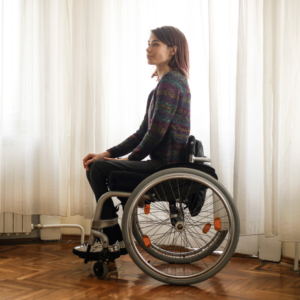Best Queens, NY Paralysis Injury Attorney Near You
If you’re a victim of paralysis, it can be difficult to know how much your life will change. You may struggle with mobility, self-care, or even basic activities of daily living (ADLs). And when you do manage to get around on your own, you may find yourself in unfamiliar situations where things don’t go as planned. For example, if you were previously able to drive but now need someone else to take you places, you might experience feelings of loss and frustration. Or maybe you used to enjoy gardening and cooking for yourself, but now you have to depend on others to help you prepare meals. These challenges are normal, but they can cause additional stress and anxiety. It’s important to remember that you don’t have to live like this forever as you can learn to live a happy and full life with your injuries by utilizing NYC Paralysis and Disability support resources.

The Queen’s personal injury lawyers at Cohen & Cohen are devoted to helping victims who have been traumatically injured due to the negligence of another person, business, or government agency. We understand how frustrating it can be when the reckless or careless acts of another person result in a serious and permanent injury that affects the rest of your life. This is why our paralysis injury lawyers in Queens are dedicated to helping protect your rights and getting you the maximum compensation you deserve for your pain and suffering. Call our attorneys handling paraplegic & quadriplegic cases today in a FREE consultation with our injury law firm.
What Is Paralysis?
Paralysis is a condition that can be caused by multiple factors, including spinal cord injuries, traumatic brain injuries, strokes, birth defects, and more. If you have been injured in an accident or suffered from paralysis, it may seem like your life has come to a standstill. However, the good news is that there are many options for people who suffer from paralysis. In fact, some of these options can help improve your quality of life and even allow you to regain some control over your body. Depending on which part of the nervous system is affected, symptoms will vary. For example, if the muscles controlling movement are paralyzed, then a person will not be able to move their legs or arms. If the nerves that send signals to the brain are damaged, then a person may experience problems with thinking, memory, language, vision, hearing, sensation, balance, and coordination.
The severity of paralysis depends on how far the nerve fibers extend into the body. This means that if the damage is limited to the neck area, then a person may only be able to move his or her head. A more severe case would involve damage to the spine and could result in complete paralysis. Paralysis can happen from these common types of accidents including:
- car accidents
- motorcycle accidents
- bicycle accidents
- truck accidents
- construction accidents
- slip and fall accidents
- pedestrian accidents
- nursing home abuse & negligence
- wrongful death
TYPES OF PARALYSIS
There are different types of paralysis and levels of function people have after an accident that results in paralysis. The National Spinal Cord Injury Statistical Center (NSCISC) reports the following prevalence of each type of paralysis occurs in the US:
- Complete quadriplegia: 12.3% of all cases
- Complete paraplegia: 19.6% of all cases
- Incomplete quadriplegia: 47.6% of all cases
- Incomplete paraplegia: 19.9% of all cases
Temporary or permanent paralysis occurs from the point of injury downward, resulting in the following types of paralysis:

QUADRIPLEGIC
Quadriplegia is the most common type of SCI. According to the NSCISC, quadriplegia cases account for approximately 58.7% of all spinal cord injury cases. This means that the person cannot move anything below the neck, and the paralysis affects both arms and both legs. Quadriplegia is also known as tetraplegia. This type of paralysis happens when there is damage done to the vertebrae in the neck or upper back, known as the cervical spine. This damage could also be complete or partial. A victim with a complete injury could have quadriplegia affecting his or her entire body, meaning that he or she may not be able to move or sense anything from the neck down. A victim with a partial spinal cord injury may have some sensation or movement but may need extensive physical therapy and occupational therapy to be able to perform even basic household tasks. This is a catastrophic type of accident requiring an experienced Queens quadriplegic injury lawyer to help recover maximum compensation.
Generally, there are two types of quadriplegia. The first type of quadriplegia is incomplete or partial quadriplegia. This occurs when there is some damage to the spinal cord in the neck but the spinal cord only suffers partial damage. This means that the spinal cord is not completely severed and some messages to and from the brain to the rest of the body may still be sent. Individuals with incomplete or partial quadriplegia may be able to move some parts of their body and their four limbs. Physical therapy and occupational therapy may help a victim with incomplete or partial quadriplegia from an auto accident regain some sensation and motor movement.

The second type of quadriplegia is complete or total quadriplegia. This occurs when there is extensive damage to the spinal cord in the neck that completely ruptures the spinal cord. This means that the spinal cord is cut into two pieces and therefore separated. Messages from one end of the spinal cord simply cannot reach the other end of the spinal cord. This means that messages to and from the brain cannot be sent or received. While there is some promising spinal cord research and experimental treatments ongoing, it is still very unlikely for a victim with complete or total quadriplegia to ever regain sensation or motor movement.
Paraplegic
The term paraplegia refers to the paralysis and loss of sensation to the trunk and lower body. Paraplegia may have many causes but a major cause is spinal cord injury. These injuries are complicated and can present with many different symptoms depending on the level of injury. When the damage to the spinal cord occurs below the level of the neck, it usually results in paraplegia. Individuals with paraplegia will have no sensation of the lower part of their trunk or legs and they will also have total paralysis of these body parts. Luckily, the arms and neck are not affected by this. This damage is most often permanent however there may be partial recovery in some individuals.
The extent of the damage is generally based on whether the spinal cord was partially severed or totally severed. A partial severance or incomplete severance is where the spinal cord suffers damage but does not completely tear. This means that there may be some decreased sensation, motor movement, and function in the parts of the body below the injury. However, a complete severance or total severance is where the spinal cord sustains an injury that completely tears it. This means that there is no function or sensation below the point of damage. There is very little likelihood that this will ever heal.
Individuals with paraplegia will have to alter their life dramatically. Due to the paralysis, these individuals will require a wheelchair and will be able to self-propel. Certain modifications to the home may be required such as an entrance ramp or widening doorways within the house to accommodate the wheelchair. Driving is possible with the use of adapted hand controls. Activities like bathing, dressing, and transfers will be difficult but often the individual can perform them independently.
Victims with paraplegia often develop complications from being wheelchair-bound such as pressure sores, obesity, and osteoporosis however they can often return to some form of exercise such as wheelchair basketball or using adapted bicycles to mitigate these factors. Physical and occupational therapy will be essential following the injury to teach the patient how to perform activities of daily living and to improve strength and range of motion to muscles and joints affected by the injury. If you’ve been in an accident resulting in paraplegia, you need to retain a paraplegic injury attorney in Queens as soon as possible to discuss your options for recovering maximum compensation.
Monoplegia
This type of paralysis affects one limb, whether that be one arm or one leg. Monoplegia typically affects one arm more often than one leg. Sometimes this condition can be temporary, but also can be permanent.
The shoulder is a common limb to be affected by monoplegia. This is because the brachial plexus nerves extend from the lower cervical vertebrae and the top thoracic vertebra to form one bundle of nerves at the base of the neck on both sides of the neck. These nerves then travel to the front of the shoulder and go down the shoulder girdle. The brachial plexus is commonly injured because a seatbelt usually comes over the nerves. In an impact, especially an explosive impact, the seatbelt will put pressure and even pull back on the shoulder and the nerve while the body may still lurch forward, including the head and neck. This can severe the brachial plexus and result in monoplegia of one arm.
There is also a lumbar plexus and sacral plexus that control portions of the leg and foot. Like the brachial plexus, if these groups of nerves are seriously damage in a motor vehicle accident it could result in monoplegia. However, it is less common for monoplegia in the leg because there are two large networks of nerves and not one like the arm, and the legs are usually protected under the siding of the door and held firmly into the seat. This is in contrast to the brachial plexus that is above the door siding and at the window which means debris could come into the vehicle and cause damage directly to the arm.
Hemiplegic
This is when a person experiences muscle weakness or partial paralysis on one side of the body, either the left side or the right side. Hemiplegia affects the arm and leg on the same side of the body, and can also affect the muscles in the lower face on that side of the body.
Diplegic
This means the person is experiencing weakness or paralysis that affects similar body parts on both sides of the body, such as affecting both arms or both legs. A common form of diplegia is known as cerebral palsy.

COMPENSATION FOR Paralysis CASES
These are staggering financial statistics that demonstrate why it is so important to retain an experienced Queen’s paraplegic and quadriplegic injury lawyers that know how to handle catastrophic paralysis injury cases. Victims of paralysis cases may be entitled to the following types of compensation for their injuries and damages:
- Pain and suffering, both past pain and suffering and future pain and suffering
- Medical bills
- Lost wages from personal injuries or medical appointments
- Lost future earnings from being unable to work in the same job or career field and having to take a job paying less
- Loss of consortium
- Mobility assistant devices such as braces, wheelchairs, or other devices
- Modifications to a victims vehicle or house including chairlifts
- Nursing care, including around-the-clock care as one ages, and
- Any other damages from paralysis accidents in NYC
What Our Clients Say
Read this 5-star Google review below regarding an accident case in Queens.
“I was involved in a car accident a few years ago where I had injured my back. Hired the attorneys of Cohen and Cohen, and was glad that I did. They were very professional from the beginning, and whenever I had questions regarding my case, they always answered my questions in a prompt manner. Also kept me updated to what was going on..”
By: Mark J
Rating: 5/5 ⭐⭐⭐⭐⭐
Read more reviews on Google!
Contact A Nearby QUADRIPLEGIC and paraplegic injury attorney in Queens Today
Our experienced Queens NYC paralysis injury lawyers understand the unique challenges faced by patients and families dealing with severe injuries resulting in paralysis of any kind. We offer FREE consultations to potential clients so we can better determine how much compensation they are entitled to and how we will aggressively fight for them to recover all damages owed. If you believe you have suffered a serious injury due to medical negligence, call us today at 718-306-6548 or contact us online. We are available for a call 24/7.

